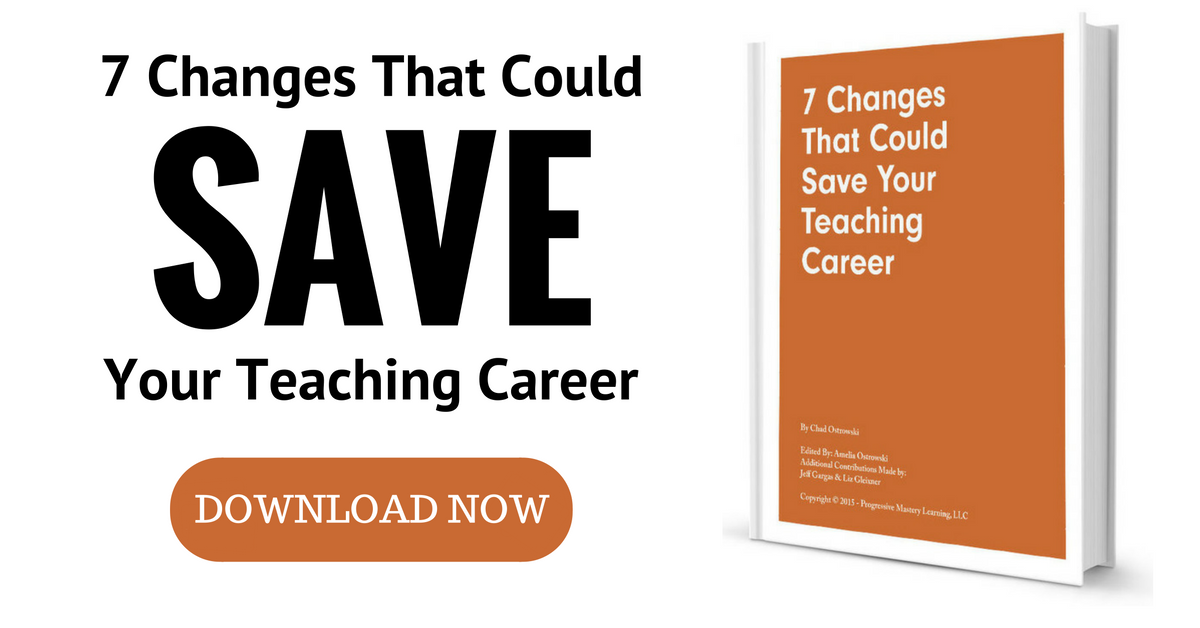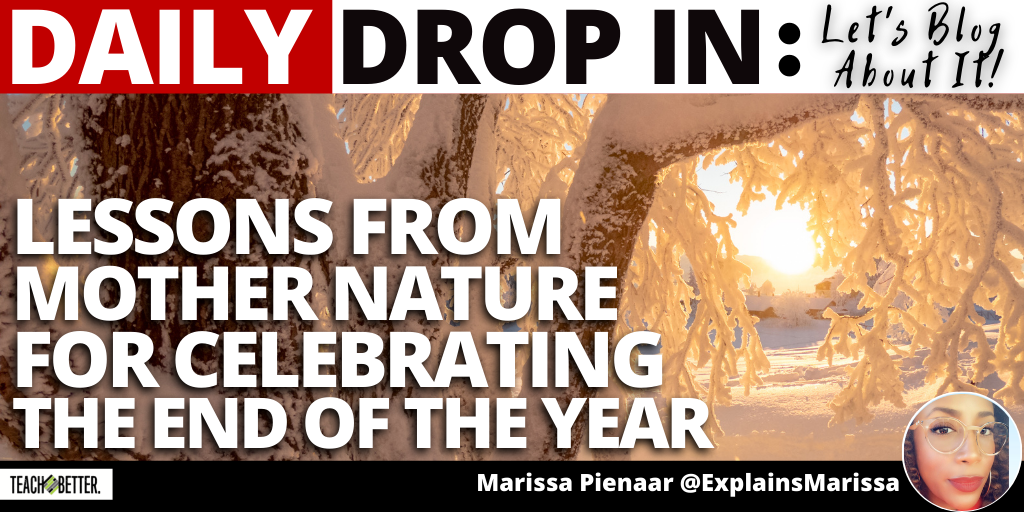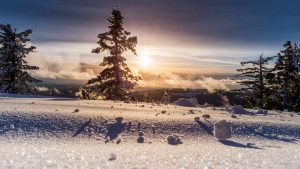TL;DR:
- The past few years have been challenging, but we can look to Mother Nature for guidance on how to rest, reflect, and restore.
- As the days become shorter in the Northern Hemisphere, focus on slowing down and resting.
- Find joy, the natural state of all beings.
- Take this time to recapture the essence of why you became a teacher.
Marissa joined Rae on the Daily Drop In to discuss celebrating the end of the year. Click here to watch!
Natural Cycles
In times of uncertainty, we can always depend on Mother Nature for guidance.
We live in a world where natural cycles occur without human intervention. The seasons shift and reflect the natural rhythms. Winter Solstice, at the conclusion of what we’ve accepted as our global calendar year, is the shortest day of the year ushering in more darkness, asking us to slow down. As Mother Nature is showing us, this is time to rest and restore. This is time to reflect and give our energy to what matters most. Productivity has replaced what we came into this profession to do, connect with, and guide our students.
We must restore ourselves emotionally by carving out time to decompress, reflect, and find joy. Click To TweetMore does not equate to better.
More does not equate to better, yet we are still expected to give as if we are bottomless wells. So many are running on fumes and squeezing from juiceless lemons, and asking the same from students. “What is valuable and worthy of our time in service for our collective growth and well-being?” is the most important question right now. Are we focusing on more worksheets, homework, evidence, data…or can we focus on more healing, connection, empathy, creativity, and joy?
When we are in touch with our mind, bodies, and spirits, we feel the effects of these natural cycles and we adjust to them. We sleep longer, do less. However, when we deny our body’s natural mental, spiritual, and physiological needs to get more done we are acting against our nature and experience burnout and breakdown. As the year closes and it’s cold outside, the days are short, and the darkness is prevalent, we must come back to our humanity in ways that restore us and bring us the joy that is our birthright.

Bears and other animals hibernate during this period of less sunlight. They replenish their energy through rest. We can do the same. By slowing down and spending time recharging, we give our minds and bodies a chance to decompress from the stress of the school year. We also have more time for self-reflection and rejuvenation which can allow us to explore new ideas and creativity.
You are not a machine. Rest.
Teachers must make time for rest and restoration as a component of their professional routine, both physically and emotionally. We must restore ourselves physically by getting sufficient rest, listening to our bodies, and moving them in ways that make us feel good. And we must restore ourselves emotionally by carving out time to decompress, reflect, and find joy. We must imbibe food, books, music, and other sensory inputs that bring us pleasure and levity. We must also be in our communities, spending time with loved ones and new connections alike.

 Teachers often consider the summer months as the best days but there are many reasons why we should also consider the end of the calendar year as a time to celebrate and find some flow. Let that nap take you, eat that whole pie, sing off-key, dance in full abandon, be a sore-winner on game night. In your classrooms, spend time cultivating community. Read aloud to your students while you are all cozy in PJs, allow them to create and express themselves in ways they imagine, use storytelling to allow them to share parts of themselves and those they come from, create classroom vision boards. Get messy!
Teachers often consider the summer months as the best days but there are many reasons why we should also consider the end of the calendar year as a time to celebrate and find some flow. Let that nap take you, eat that whole pie, sing off-key, dance in full abandon, be a sore-winner on game night. In your classrooms, spend time cultivating community. Read aloud to your students while you are all cozy in PJs, allow them to create and express themselves in ways they imagine, use storytelling to allow them to share parts of themselves and those they come from, create classroom vision boards. Get messy!
Allow families time to rest.
Additionally, allow families time to rest and restore as well. Don’t give busy parents more work to do. If you must give homework, have it consist of work that connects the students to their loved ones in meaningful ways.
You are better rested. You are more creative when restored. Joy is the natural state of all living beings. Take this time to recapture the essence of why you became a teacher in the first place, and reflect on all the achievements you’ve been unable to slow down and acknowledge. Celebrate yourself, you are so deserving!
About Marissa Pienaar
Marissa Pienaar, M.Ed is a lifelong lover of books and knowledge. She has an insatiable curiosity that never lets her stop learning, studying, and exploring. Marissa earned her undergraduate degree in Pan-African Studies before pursuing a Master’s Degree in Education with a Reading Specialist Certification.
She has worked as a tutor, an intervention specialist, a Peace Corps education volunteer, a curriculum director, an assistant professor and has held numerous other titles in education. Her favorite title is guide, as it encompasses the humility and bi-directionality of the teacher/learner relationship that she aims to embody in her work and personal journey as an educational practitioner. She is always both teacher and learner simultaneously.
She’s a true lover of the diversity of the human species that we have been gifted with. She believes that, like other things in nature, the diversity of our humanity is beautiful, interconnected, and absolutely necessary for our collective survival and evolution.
Marissa lives to help others through liberatory education, literacy, and community development work that centers the voices of marginalized groups and leads us to a more just world. She is currently obsessed with abolitionist, liberatory, and other emerging pedagogies and what they mean for the future of education.




